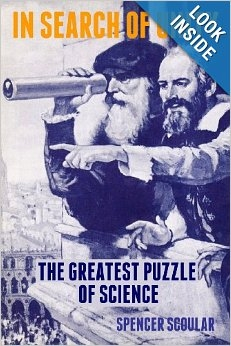
In Search of Unity
The Greatest Puzzle of Science
- 2013 INDIES Finalist
- Finalist, Science (Adult Nonfiction)
This erudite and engrossing journey through the modern sciences approaches the elusive “unified theory.”
Spencer Scoular, a consultant who holds a PhD from Cambridge, moves to flesh out the incomplete, mathematically based frameworks within which modern sciences have attempted, often not in concert with one another, to explain the universe. Scoular resists the notion that scientists should entertain niche interests and offers this more comprehensive basis for an empirically based worldview. The project stands to become a center of impassioned discussion among scholars and a source of intrigue for those outside of scientific fields.
Scoular’s beginning pages show that the sciences moved away from their earliest impulses to describe existence in a holistic manner and instead ventured in the direction of explaining pieces of the whole. However, if guided by a central set of principles descriptive of all existence, the sciences, Scoular believes, can avoid absorption in the minutia and return to the business of usefully and comprehensively explaining what is.
The author presents a set of axioms—which he calls universal, verifiable principles—that could run beneath all unified scientific inquiry. Included are assertions that the universe is real but has not always been, and that it is guided by certain laws and constants, among them light speed and gravity. Scoular’s principles grapple only with what can be known, eschewing the types of theorizing which become mere esoteric exercises.
From there, Scoular progresses to a series of chapters which can stand alone according to the reader’s own scientific interests. They are views of the sciences, unified—of a physics in which relativity and quantum theory are put into conversation, for example. A line is drawn between the knowable universe and the unknowable.
Later chapters do the same kind of work, amalgamizing theories of biology, psychology, and economics. The chapter on biology contains a thorough recap of the development of theories of evolution, which Scoular maintains as the science’s nexus, and features some of his most hopeful writing. “Darwin overturned the belief that man was at the centre of the biological world,” he asserts, maintaining deep respect for the trailblazer whom he nonetheless proposes to eclipse. As with elsewhere, even those not swayed by the chapter’s conclusions will be drawn in by the reverence Scoular holds for scientific greats.
A book attempting to unify all of science is bound to cover considerable ground, and Scoular’s does, within the span of a few hundred pages. Necessarily, some of his theories remain abstract, but they remain compelling and should provide fuel for many involved conversations.
Scoular’s insights on histories of scientific development are well drawn and engaging; readers may enjoy the reintroductions to figures from Newton to Darwin. Ubiquitous citations of and quotations from scholars ranging from the beloved to the lesser known will persuade even those outside of the sciences that Scoular is amply knowledgeable. In Search of Unity is challenging, but a pleasure to read.
Reviewed by
Michelle Anne Schingler
Disclosure: This article is not an endorsement, but a review. The publisher of this book provided free copies of the book and paid a small fee to have their book reviewed by a professional reviewer. Foreword Reviews and Clarion Reviews make no guarantee that the publisher will receive a positive review. Foreword Magazine, Inc. is disclosing this in accordance with the Federal Trade Commission’s 16 CFR, Part 255.
